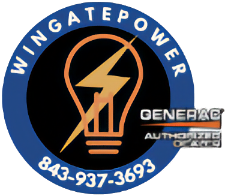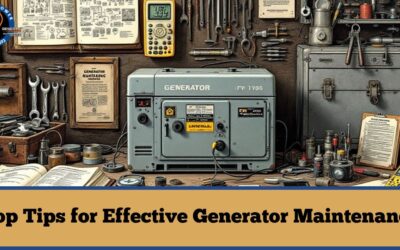Wondering if a natural gas home generator is right for you? In an era where dependability is key, these generators offer more than just power—they’re a blend of cost-efficiency, environmental consideration, and assured fuel supply. Read on to discover how investing in a natural gas generator can safeguard your home against outages and bring peace of mind.
Key Takeaways
- Natural gas generators are more economical, environmentally friendly, and have a reliable fuel supply compared to gasoline or diesel generators.
- There’s a range of natural gas generators – portable, inverter, and home standby – designed for different needs and conveniences with options like the dual-fuel capability for added flexibility.
- Professional installation and regular maintenance are essential for the safety and optimal performance of natural gas generators, and understanding your power needs is crucial before purchase.
Benefits of Natural Gas Generators
The image that usually comes to mind when thinking of a generator is a bulky, noisy machine consuming gallons of gasoline. But did you know that natural gas generators offer a cleaner, more cost-effective alternative? Not only are they more economical due to lower fuel costs, but they also ensure a reliable fuel supply, keeping your essential appliances running smoothly even during emergencies.
Environmental Impact
Unlike traditional gasoline or diesel generators, natural gas generators are much kinder to the environment. Primarily composed of methane, natural gas emits fewer pollutants than other fossil fuels. This cleaner burning process makes them a more environmentally friendly choice for power generation, perfect for those who want to reduce their carbon footprint.
Cost Savings
Looking to save some money without sacrificing power? Natural gas generators have you covered. Their lower operating costs and reduced fuel delivery expenses make them a budget-friendly choice, especially when considering the efficiency of NG as a fuel source.
As an example, operating a Generac natural gas generator could cost you around $20-$40 per day at 50% load during a power outage, and a mere $5 to $10 per month in exercise mode.
Fuel Supply Reliability
The utility of a generator becomes questionable if it exhausts fuel precisely when you need it the most. With a natural gas generator, you never have to worry about running out of fuel. These generators can be directly linked to natural gas pipelines, ensuring a steady and reliable fuel supply, even during prolonged power outages.
Types of Natural Gas Generators
Natural gas generators, similar to their gasoline equivalents, are available in a variety of types to meet diverse power requirements. Whether you’re looking for a portable generator for your on-the-move electricity needs or a home standby model for seamless backup power, there’s a natural gas generator out there that’s perfect for you.
Portable Natural Gas Generators
Portable natural gas generators are the perfect companions for your camping trips or outdoor events. They provide power in diverse locations and come in various wattages and engine types to cater to different energy needs.
For instance, the Generac GP6500 CoSense Portable Generator stands out with its substantial starting capacity and integrated safety mechanisms, making it ideal for handling large appliance startup loads.
Inverter Natural Gas Generators
Inverter natural gas generators are an excellent option for individuals in search of a quieter, more fuel-efficient solution. These generators are designed for quiet operation, making them especially beneficial for residential and sensitive environments.
One notable example is the Generac iQ3500, a 3500-watt inverter generator featuring an electric start and a durable metal enclosure.
Home Standby Natural Gas Generators
For seamless backup power throughout your home, a home standby natural gas generator is unmatched. These generators are semi-permanent installations that automatically kick in during a power outage, ensuring continuity and convenience.
The Generac 7043 Home Standby Generator, for instance, can power an entire house and even offers remote monitoring via smartphone.
If seamless backup power is what you’re after, home standby natural gas generators are your best bet. These generators offer:
- Automatic activation during a power outage
- Continuity and convenience
- Direct connection to your home’s power system
- Ability to power essential circuits
With a home standby natural gas generator, you never have to worry about a power outage again, avoiding the mistake of being unprepared.
Dual-Fuel Capability: Generac Generators
The dual-fuel capability of Generac generators is one of their significant benefits. This means they can run on both natural gas and liquid propane, giving you the flexibility to switch between fuel types based on availability, cost, and personal preference.
This unique feature ensures that you always have a reliable power source, no matter what.
Propane vs. Natural Gas
Both propane and natural gas have their merits when making a choice between the two. Propane is more energy-dense and cleaner-burning, making it a potent power source that contributes to less pollution.
On the other hand, natural gas is cheaper and offers more convenience, especially if you have an existing and reliable supply line to your property.
Converting Generac Generators
The ability of Generac generators to switch to various fuel sources is among their most advantageous features. With a conversion kit, Generac generators that run on propane can be converted to run on natural gas.
This capability offers flexibility and ensures continuous power supply by utilising the most available fuel during different situations, providing easy access to energy resources.
Fuel Storage Considerations
Safety must be your foremost concern when storing fuel for your generator. Here are some guidelines to follow:
- Fuel for natural gas generators must be stored externally to living spaces
- It should be stored in a locked and secure area
- It should be kept separate from fuel-burning appliances
- Adhering to local laws is crucial, as there may be restrictions on the amount of fuel that can be stored and where it can be kept.
Professional Installation for Optimal Performance
Procuring a generator is merely half the task; its proper installation is of equal importance. A professional installation not only guarantees safe operation but also ensures compliance with local codes, enhancing the system’s safety and functionality. Plus, it maintains the validity of the manufacturer’s warranties, which can be crucial for future maintenance or warranty claims.
Selecting the Right Installer
Selecting the appropriate installer for your generator is a decision that requires careful consideration. It’s crucial to select an experienced and licensed contractor who can handle both gas plumbing and electrical work. Verifying that the contractor is insured and knowledgeable about permit requirements can also save you a lot of headaches down the line.
Installation Process
The installation of a natural gas generator involves several steps:
- Site preparation
- Adherence to local codes
- Gas line connection
- Integration with your home’s electrical systems
This process can be complex, so it’s important to hire a professional installer.
Maintenance Recommendations
Similar to any machine, your generator requires regular maintenance to maintain optimum condition. This includes:
- Weekly alarm and functionality checks
- Monthly inspections of fluid levels
- Bi-annual comprehensive assessments
- Annual servicing for filter replacements and system flushes.
Regular maintenance is crucial for the longevity and safe operation of your generator.
Assessing Your Power Needs
Prior to selecting the suitable generator, an assessment of your power requirements is necessary. This involves calculating the total load from all the devices you want to power and making sure it doesn’t exceed the generator’s output. It also involves deciding which circuits in your home are essential and need to be powered during an outage.
Calculating Power Consumption
To calculate power consumption, you need to:
- Total the wattage of all the appliances and devices you aim to power.
- Take into account the specific wattage requirements of common household appliances.
- Convert the total wattage figure to kilowatts.
- Add a 20% safety margin to find the minimum generator capacity needed for your home.
FREE SHORTCUT! If you’d like to skip the math, have us come out for a FREE In-Home Consultatoin! You’ll find out the exact generator that best fits your needs and have a 100% accurate price of your entire project.
Essential vs. Non-Essential Appliances
All appliances in your home are not of equal importance. Some are essential and need to be powered during an outage, while others are not. When determining the size of a generator, you should first secure power for essential circuits in your home. You may then decide to include additional circuits for conveniences according to personal preference.
Generator Sizing Tools
If these calculations appear to be somewhat overwhelming, fret not! There are generator sizing tools available that can simplify the process. You simply input your household appliances and their respective wattages, and the tool will give you a total power requirement calculation. Just remember to choose a generator with a wattage output that exceeds the maximum expected load for reliability.
You can also have us come out and do all of the sizing for you during a FREE In-Home Consultation.
Top Brands Offering Natural Gas Generators
Having understood your power needs and the advantages of natural gas generators, let’s explore the leading brands in the market. Some of the top brands include:
- Generac (We are authorized dealers of Generac and with 30+ years of experience, we highly recommend Generac for most applications)
- Briggs & Stratton
- Honda
These brands have found a significant presence in the market and are known for their reliability and range of products.
Generac
Generac, a reputed name in the generator industry, is famous for its range of natural gas home generators. Whether you’re looking for a portable model or a home standby unit, Generac has you covered. Plus, their generators come with a sturdy aluminum shell and are backed by a three-year warranty for peace of mind.
Briggs & Stratton
Briggs & Stratton is another notable brand to consider. They offer a variety of home generators suitable for different power needs. What’s more, they offer financing options, allowing you to manage the investment through monthly payment plans.
Honda
Additionally, Honda provides a range of natural gas generators that are ideal for diverse home applications. Their generators feature advanced inverter technology, offering fuel-efficient, quiet, and clean power. Plus, their CO-MINDER™ system detects carbon monoxide levels and automatically shuts down the generator if high levels are reached, ensuring your safety.
Preparing for Emergencies: Backup Power Plans
Considering the unpredictability of emergencies and power outages, having a backup power plan in place is critical. Whether it’s a natural disaster or a simple power outage, a reliable power supply can make a world of difference, keeping your home safe and your essential functions running uninterrupted.
Emergency Power Strategies
The inclusion of a backup generator is pivotal in any emergency power strategy. But there’s more to it than that. You also need to know how to conserve power during an outage, such as by staying in one room and insulating your windows and doors. And of course, natural gas generators play a vital role in these strategies by ensuring a stable power supply when renewable sources are not available.
Safety Tips for Generator Use
Prioritising safety is essential when operating generators. Here are some important safety tips to keep in mind:
- Use your generator outside and at least 20 feet from your home.
- Install carbon monoxide detectors on every level of your home.
- Avoid backfeeding by plugging the generator directly into a wall outlet.
These safety tips can help prevent accidents and ensure your generator operates optimally during power outages.
Storing Fuel and Maintaining Your Generator
To ensure optimal performance, it’s critical to store fuel properly and maintain your generator regularly. Fuel for natural gas generators must be stored externally to living spaces and separate from fuel-burning appliances.
On the maintenance front, regular checks and inspections are necessary to ensure the longevity and safe operation of your generator.
Benefits of Natural Gas Generators
For a quick recap, let’s briefly revisit the advantages of natural gas generators. They’re efficient, cost-effective, and environmentally friendly, offering cleaner emissions than other types of generators.
Plus, they ensure a reliable fuel supply, so you’ll never have to worry about running out of power in an emergency.
Environmental Impact
Natural gas generators excel in terms of environmental impact. They produce lower emissions compared to other fossil fuels, making them a cleaner choice for power generation. So you can keep your lights on without worrying about your environmental impact.
Cost Savings
For those mindful of their budget, the cost savings offered by natural gas generators will be highly appealing. Not only do they have lower operating costs than diesel generators, but they also require less frequent refueling, reducing your fuel delivery expenses. Plus, they’re more economical due to lower fuel costs.
Fuel Supply Reliability
One of the most impressive aspects of natural gas generators is undoubtedly their fuel supply reliability. They can be linked directly to natural gas pipelines, ensuring a consistent fuel supply even during prolonged power outages.
So you can rest easy knowing that your essential appliances will keep running no matter what.
The Perfect Generator For You
By this point, you should have a comprehensive understanding of:
- the advantages of natural gas generators
- the different varieties of natural gas generators
- popular brands of natural gas generators
- how to evaluate your power needs
If you’re still uncertain about which generator to purchase, don’t fret! Wingate Power offers free in-home consultations to answer all your queries and assist you in finding the perfect generator for your needs.
Summary
All in all, natural gas generators offer a reliable, cost-effective, and environmentally friendly power solution, making them an excellent choice for anyone looking for a backup power source. Whether you opt for a portable, inverter, or home standby model, you’ll be investing in peace of mind, knowing that you’ll always have a dependable power supply, no matter what.
If you’re ready to find out which generator is best for you, get a FREE In-Home Consultation! There’s no obligation or pressure to purchase your generator from us and by the end of the visit, you’ll know the exact generator that best suites your needs and have the accurate price for your project.
Frequently Asked Questions
Can Generac generators that run on propane also run on natural gas?
Yes, Generac generators that run on propane can be converted to run on natural gas with a conversion kit. This can offer added flexibility in fuel options.
How long will a Generac generator run on propane?
A Generac generator will run for approximately 2 to 3 hours on a gallon of propane.
What size propane tank is recommended for a whole house Generac generator?
Generac recommends at least a 250 gallon propane tank for a whole house generator. This size ensures a sufficient supply during power outages.
How much does it cost to run a Generac generator for 24 hours?
It can cost around $20-$40 per day to run a Generac generator for 24 hours at around 50% load on gas. So, be prepared for that expense if you’re planning for a power outage.
What are the two fuel options for Generac home generators?
The two fuel options for Generac home generators are propane and natural gas. Both are commonly used and widely available.




![[VIDEO] Why Now is the Best Time to Prepare for Storm Season with a Generator](https://www.wingatepower.com/wp-content/uploads/2025/01/Palmetto-Live-Jan-2025-Segment-WingatePower-Generac-Generators-400x250.jpg)

![[VIDEO] Beating a Charleston Power Outage: Protect Your Home with a Generator](https://www.wingatepower.com/wp-content/uploads/2024/10/Charleston-Power-Outage-Solution-Generators-400x250.jpg)